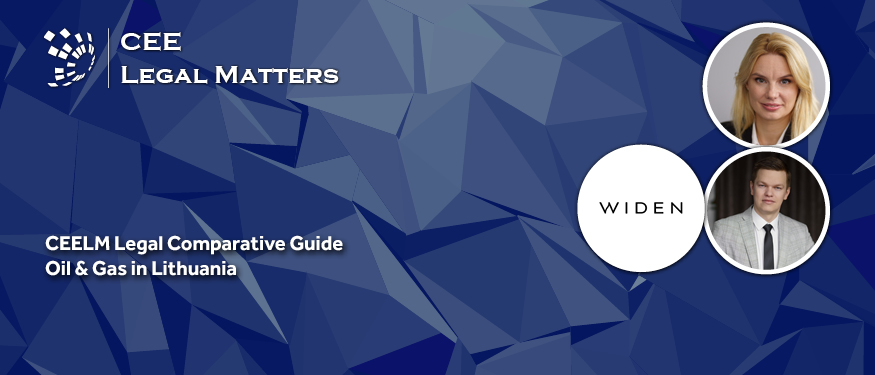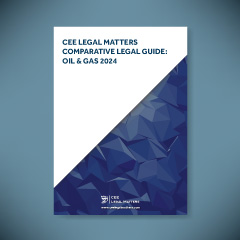Contributed by Widen.
- Summary
Lithuania has been a member of the European Union for 20 years, so the main regulation and legal framework is in line with the general nature and tendency of European Union regulation.
The Law on Energy Resources Market set the legal framework for the establishment of an energy resources exchange. By implementing of the Third Energy Package in the Lithuanian gas sector was accomplished in 2014 November. It was intended to split generation from transmission and, by breaking up the dominant vertically integrated monopoly, to create competition and increase transparency in the natural gas market. It was also intended to help create a functioning regional gas market in the Baltic States (info source: https://enmin.lrv.lt/en/sectoral-policy/natural-gas-sector/).
Lithuania remains an important gas hub for neighboring countries. In 2023, a total of 61.2 terawatt-hours of natural gas was transported through the Lithuanian gas transmission system. The Klaipeda LNG terminal, the main source of gas imports for Lithuania and the other Baltic countries accounted for 85% (31.9 terawatt-hours) of the total gas transported into the system in 2023 (info source: https://ambergrid.lt/en/for-media/news/lithuania-consumed-almost-15-twh-of-gas-in-2023/980).
The LNG delivered to the terminal is transported through Lithuanian transit pipelines, operated and maintained by the state-owned operator Ambergrid.
Following the connection of the first biomethane plant to the gas transmission system last year, 47-gigawatt-hours of green gas produced in Lithuania with guarantees of origin were injected into the system (info source: https://ambergrid.lt/en/for-media/news/lithuania-consumed-almost-15-twh-of-gas-in-2023/980).
- Overview of The Country’s Oil & Gas Sector
2.1. Legal Framework – A Brief Outline of Your Jurisdiction’s Oil & Gas Sector
Lithuania has been a member of the European Union for 20 years and is fully subject to European Union regulation.
The main national legislation in this field is the Law on Petroleum Products and State Oil Reserves, the Law on Energy, the Law on Natural Gas, and the Law on Liquefied Natural Gas Terminal.
In May 2012, the Seimas adopted the Law on Energy Resources Market, which laid down the legal framework for the establishment of an energy resources exchange and regulates the platform for the trade of biofuels, petroleum product stocks, natural gas, and the use of instruments for hedging against energy price volatility (info source: https://enmin.lrv.lt/en/sectoral-policy/natural-gas-sector/).
There are no legal restrictions for oil & gas imports, except the restrictions on gas trade with Russia and Belarus.
2.2. Domestic Oil & Gas Production and Imports/Exports
In the wake of the energy crisis in Europe, the Lithuanian-operated LNG terminal Independence has become the LNG import infrastructure not only for Lithuania but also for the surrounding countries (Latvia, Poland), which is being used to its maximum capacity and has already been contracted to be fully loaded by 2033. The LNG delivered to the terminal is transported through Lithuanian transit pipelines, operated and maintained by the state-owned operator Ambergrid.
There are no or almost no indigenous resources in Lithuania and the corresponding production infrastructure has not been developed. Orlen Lietuva, a large refinery for imported crude oil, operates in the country.
2.3. Foreign Investment and Participation
The requirements for foreign investors are mainly related to compliance with national security interests and the scope of the planned activities.
The LNG terminal is currently being bought by the state itself and cannot be subject to privatization.
2.4. Protection Of Investment
The main international treaties Lithuania is a party to are the Energy Charter Treaty, the Protocol to the Energy Charter, and the Convention on the Settlement of Investment Disputes between States and other Natural and Legal Persons of the European Union of March 18, 1965.
The relevant treaty obligations may be broadly applicable, but there are not many international cases to which Lithuania is a party in this sector.
- Exploration of Oil & Gas
3.1. Granting of Oil & Gas Exploration Rights
The main legislation governing the potential exploration of oil and gas as a resource is the Law on Subsoil. It sets out the requirements for individuals conducting exploration.
The main authority issuing exploration permits is the Geological Survey under the Ministry of Environment, and tenders for permits are issued and organized by the government.
Significant deposits of shale gas resources have been reported recently but have not been extracted due to a lack of investment.
3.2. Foreign Exploration
The state is constitutionally considered the owner of all fossil resources. An entity, irrespective of who owns it as a legal person, acquires the right to extract and dispose of the resources in question by paying a tax to the state for each unit of resource. The amount of the tax shall be determined by the Law on Hydrocarbon Resources Tax.
Restrictions or limitations are set on an individual basis in relation to the rate of extraction and the potential environmental impact.
3.3. Stages of the Exploration Process
The first step is acquiring the right to carry out actions in the territory. If exploration is to take place on private land, the owner's consent is required. If it is carried out on public land, it must be coordinated with the state. In some cases, exploration and exploitation may be subject to a public tender. If tendering is envisaged, the government shall first carry out strategic environmental aessessment procedures for plans and programs.
Exploration of the earth's subsurface may only be carried out by an entity that has obtained a special permit from the Geological Survey to explore the earth's subsurface. An environmental impact assessment must be carried out prior to any exploration activities. The requirement for exploration does not apply if the resources in the area concerned have already been explored according to data published by the Geological Survey. In this case, the data can be used.
Once the exploration data has been approved, a plan for the use of the subsoil is prepared and agreed upon. Once the plan has been agreed, a special permit for the exploitation of the subsoil resources is issued.
3.4. Obligatory State Participation
If a site for exploration and exploitation is to be subject to tender, the government must first carry out a strategic environmental assessment of the plans and programs. State involvement takes the form of permits for formal public interest procedures and the collection of taxes, rather than direct interference in business activities.
All the geological information that has been collected historically is managed by the Lithuanian Geological Survey.
3.5. Risks To Be Considered
An important risk to be considered is dealing with local communities and the negative attitudes towards extraction.
- Production of Oil & Gas
4.1. Granting Of Oil & Gas Production Rights
The State Energy Regulatory Council is the main executive authority for issuing permits and licenses and supervising and controlling these entities. Decisions on permits are taken in accordance with the orders of the Minister of Energy and the laws adopted by Parliament.
Current governmental and parliamentary initiatives involve a significant increase in excise duty, with the additional tax revenue being directed towards national security needs. There is an active public and business initiative, already registered in Parliament, to reduce petroleum fuel consumption by 41% by 2030 compared to 2023 consumption. The share of renewables in petroleum fuels is continuously increasing.
4.2. Foreign Production
Oil & gas resources are in fact scarce and practically untapped in Lithuania. There are only a few small-scale extraction sites that have been set up and are operated at State expense. However, as mentioned above, the State could seek to tender for the extraction of the resources on an equal footing, except in a few specific cases.
Trade and payment of taxes are carried out in the same way as for private domestic entities.
4.3. Stages of the Production Process
Individual phases are not to be distinguished during extraction. Additional requirements for accounting, declarations, etc. are provided. For all operations, the legitimacy of the operations and the use of raw materials and goods must be recorded in the license and permit issued.
4.4. Obligatory State Participation
The Hydrocarbon Resource Tax Law imposes an obligation on an entity to pay a tax to the state for the amount of resources extracted. The current tax rate is between 9% and 15% of the selling price per cubic meter of oil or gas.
The government sets VAT and excise tax for oil & gas production. There are no legal restrictions for oil & gas imports. Oil & gas prices are not regulated by the state, except gas supplied to common usage equipment.
The state is obliged by regulatory legislation not to trade gas with Russia and Belarus and to comply with international, European Union, and national sanctions.
4.5. Risks To Be Considered
The main risks related to the production of oil & gas in Lithuania are i) limitation of local processing capacity. In Lithuania, there is basically only one refinery, Orlen Lietuva; ii) there are no oil pipelines in Lithuania and transport is organized by mobile vehicles and trains.
- Termination of Production of Oil & Gas
5.1. Abandonment and Decommissioning
Oil & gas exploitation is carried out in accordance with an agreed exploitation plan and a permit, which includes operating conditions. Failure to comply with them is subject to warning, sanctioning, and possible withdrawal of the permit.
The existing permit will be revoked if the permit has not been used for four years (non-commissioning), if a material breach is detected which is not corrected within two months, or if the resource is exhausted in the planned area.
5.2. Environmental and HSE Consideration
The authorities that are in charge of abandoning and/or decommissioning oil & gas facilities are the State Tax Inspectorate (on tax collection), the State Energy Regulatory Council (on compliance with legislation, including licenses), the Fire and Rescue Department (on fire safety), and the Geological Survey of Lithuania (on the conditions of the permit and on the implementation of the use plan).
- Safety of Oil & Gas Exploration and Production
6.1. International Treaties to Which the Jurisdiction Is a Party
Lithuania is a party to all main international treaties in the field of safe exploration and production of oil & gas: Convention on Civil Liability for Oil Pollution Damage, 1992; Protocol to the International Convention on the Establishment of an International Fund for Compensation for Oil Pollution Damage, 1992; International Convention on the Establishment of an International Fund for Compensation for Oil Pollution Damage, 1992; Protocol to the Convention on the Establishment of an International Fund for Compensation for Oil Pollution Damage, 1990. International Convention on Preparedness, Action, and Cooperation in the Event of Oil Pollution Incidents, (OPRC 1990); Protocol of 1992 to the International Convention on Civil Liability for Oil Pollution Damage, 1969 (CLC PROT 1992), etc.
6.2. Offshore Safety Directive
The Offshore Safety Directive has been transposed into the Law on Subsoil in substantially similar terms and wording to the directive itself, with the competent authorities being assigned to perform and enforce the relevant control functions.
- Import, Export, and Sales of Oil & Gas
7.1. Import and Export of Oil & Gas
Import and export of oil and gas are subject to the general European Union requirements and regulations. In recent years, restrictions under international, European Union, and national sanctions on state imports of gas of Russian origin started to be applicable.
7.2. Transportation
The installation of an off-site transport pipeline requires design work, including obtaining the consent of all owners of the land through which the pipeline will be laid, environmental impact assessments, establishment of buffer zones, and obtaining building permits. In Lithuania, private transport pipelines are exceptionally rare. All international pipelines are operated by the state-owned operator Ambergrid and are owned by the state.
7.3. Land Rights
These projects usually require the conclusion of agreements with landowners to establish easements and protection zones. If landowners do not agree, a court procedure might be required. For public authorities to be able to enforce easements and buffer zones, a project must be declared to be of national interest. In this case, decisions are taken by administrative acts, even without the landowner's consent or even in case of objections (fair compensation must be paid to the owner).
7.4. Access and Integration
The main pipeline in Lithuania supplies oil from the Butinge terminal to the refinery of Orlen Lietuva. There are more multi-directional pipelines. The newest one, built in 2021, is called GIPL, connecting Lithuania and Poland.
To use the gas pipeline network, an application is made to the operator and, once the conditions have been negotiated, a contract for the use is signed. Individual restrictions are linked to energy and trade sanctions imposed on neighboring countries.
7.5. Gas Transmission and Distribution
Lithuania's gas transmission and distribution network consists of approximately 2,000 kilometers of gas transmission pipelines and 8,300 kilometers of distribution grids (info source: https://enmin.lrv.lt/en/sectoral-policy/natural-gas-sector/).
Almost all gas networks are owned by the State in Lithuania. Ambergrid, a state-owned entity, has been appointed operator. No private operator is allowed. The use of the gas network is subject to an application to the operator and, once the terms and conditions have been agreed, a contract for the use is concluded.
Charges are regulated and set by the State Energy Regulatory Council every year. The fees are published on the website of the state operator "Ambergrid". It consists of the reservation and service fee, the intensity and amount of use, and the difference between the entry points and the exit points.
- Trading
8.1. Trading License
Natural gas is traded on the Baltic Natural Gas Exchange GetBaltic. Trading on the exchange is subject to the State Energy Regulatory Council's authorization. LNG is traded both wholesale and retail under a license issued by the State Energy Regulatory Board.
8.2. Products
The natural gas stock market in Lithuania is divided into the following products: current day, day-ahead, near-future days, and monthly. The potential step change is the same for all of them: volume – more than 1 megawatt-hour; price step – EUR 0,01 per megawatt-hour. The intraday and day-ahead products are traded together with the capacity, the other products are not.
- Competition
9.1. Authorities
The Competition Council is the general authority for the protection of competition in the natural gas sector. The State Energy Regulatory Council is the specialized authority for energy issues. It assesses prohibited agreements, cartels, abuse of dominant position, concentration, etc.
9.2. Anti-Competitive Actions
Transaction control is limited to the application of sanctions, the determination of actual quantities, and taxation (excise duties, VAT). Transfers of assets, infrastructure management companies, etc. may be subject to controls if the objects are of significant size and their compliance is assessed in the interests of national security. Similarly, transfers of assets and legal entities may be prevented by the Competition Council if they threaten to infringe competition regulations, including possible concentration.
- Stability Clause and Dispute Resolution
10.1. Stability Clause
N/A
10.2. Compulsory Dispute Resolution Procedure
Lithuania applies a compulsory dispute resolution procedure – if a complaint is lodged with the network operator (in case the transmission network is used), the dispute is then subject to a compulsory pre-litigation procedure before the State Energy Regulatory Council. Afterward, the dispute can move to a court of general jurisdiction.
10.3. International Treaty Protection
Lithuania has ratified both the New York Convention on the Recognition and Enforcement of Foreign Arbitral Awards and the Convention on the Settlement of Investment Disputes between States and Nationals of Other States (ICSID).
No specific complications can be identified in litigating or seeking to enforce judgments or awards against government authorities or state organs, however, there are not many international cases in the sector. The most significant was the case of Lithuania v Gazprom in Stockholm arbitration which was lost by Lithuania.





